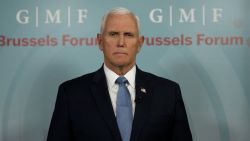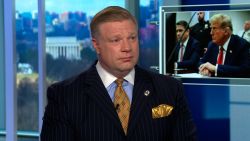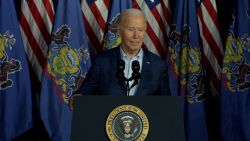For days, Utah Sen. Mitt Romney had been a lone Republican voice expressing concern about President Donald Trump’s July phone call with Volodymyr Zelensky in which Trump asked Ukraine’s President to investigate former Vice President Joe Biden and his family.
Romney came to Washington promising to speak out against the President when the time called for it. Days ago, he became the first prominent elected Republican to convey his dismay about Trump asking Ukrainian President Volodymyr Zelensky to dig up dirt on Biden, one of Trump’s political rivals for the White House, and Biden’s son at a time when Trump was withholding aid to Ukraine.
There is no evidence of wrongdoing by either Joe Biden or Hunter Biden.
There were some signs on Wednesday evening that other Republican voices, including one GOP senator who had read the whisteblower complaint in a secure setting, that Romney may no longer be alone in his concerns.
Romney stood his ground on Wednesday after reading the call summary of the discussion between Trump and Zelensky.
“My reaction was the same as (the one) I had a few days ago, which is – this remains deeply troubling,” Romney said during an interview at The Atlantic Festival on Wednesday. “We’ll see where it leads, but the first reaction is troubling.”
Nebraska Sen. Ben Sasse, a Republican up for election in 2020, echoed those thoughts after reading the complaint on Wednesday evening.
“This (is) going to take a long time but there’s obviously some very troubling things here. But I think the partisan tribalism that’s always insta-certain is a terrible idea. There are real troubling things here. Republicans ought not just circle the wagons and Democrats ought not be using words like ‘impeach’ before they knew anything about the actual substance.”
Other senators had criticisms for the President as well. Sen. Pat Toomey, a Pennsylvania Republican, called Trump’s conversation with Zelensky “inappropriate” in a statement earlier in the day.
GOP Ohio Sen. Rob Portman also told CNN’s Manu Raju that nothing in the transcript surprised him. “It was exactly what I expected.”
But when pressed about whether Trump should have asked the Ukrainian leader to investigate Biden, Portman added: “It didn’t surprise me, because he said he did. I would rather have seen that—yes—he should not have.”
It was on Sunday that Romney tweeted that “if the President asked or pressured Ukraine’s president to investigate his political rival, either directly or through his personal attorney, it would be troubling in the extreme. Critical for the facts to come out.” That made him the first Republican to forcefully express concern with Trump’s actions.
The Trump White House clearly believed Wednesday that releasing details of the July 25 conversation – as well as sending the related whistleblower complaint to Congress – would clear up the matter for their opponents and doubters, and perhaps ease some of the pressure for impeachment proceedings in the US House.
But as lawmakers parsed the sentences of the call summary on Wednesday, the opposite seemed true. Still, most Republicans swiftly fell in line with the administration’s argument that the call summary showed there was no direct quid pro quo.
Romney, on the other hand, continued to say he wanted to see all the information, including the allegations contained in the whistleblower complaint that the White House is sending over to Congress.
Romney sidestepped a question at The Atlantic Festival about whether he saw the implication of a quid pro quo in the call summary.
The Utah senator explained he “wasn’t as focused” on the potential quid pro quo aspect of the call as others, but added: “If the President of the United States asks or presses the leader of a foreign country to carry out an investigation of a political nature that’s troubling, and I feel that.”
To underscore his point, the Utah senator pointed to the extraordinary power of the presidency, as well as the House and the Senate.
“I think it’s very natural for people to look at circumstances and see them in the light that’s most amenable to maintaining their power and doing things to preserve their power,” Romney said when asked by the moderator why he was virtually alone among GOP officials in highlighting the seriousness of the potential offense by the President.
Perhaps as a way of explaining Trump’s motivation for talking to Zelensky about Biden and his son – and his party’s inclination to defend the President, Romney noted that both parties feel deeply that if the opposing party were in charge “terrible things would happen for the country … and it’s critical for them to hold on to their leadership.”
“I think it’s just in human nature to see things in a way that is consistent with your own world view and your sense of what’s necessary for the preservation of your position of power,” Romney said. “I don’t know why I’m not afflicted to the same degree as perhaps others are in that regard. Maybe it’s because I’m old and have done other things.”
The Utahn declined to wade into the impeachment debate, stating that the House was considering the President’s actions and that he wasn’t going to “give advice to Speaker Pelosi.”
When Romney was elected to the Senate from the deep red state of Utah, he promised that he would stand up to Trump if he believed he was wrong. That was appreciated by his constituents who – though overwhelmingly Republican – generally give lower marks to Trump than voters in other red states.
“He’s got a pretty strong moral compass,” said Lanhee Chen, who advised Romney on foreign policy during his 2012 run for the White House.
“He was going to speak his mind without regard to party or politics, and this is very much in line with that,” said Chen, a fellow at the Hoover Institution and lecturer in the public policy program at Stanford University. “He has great concern about what he sees as potential misuse or malfeasance in office.”


















